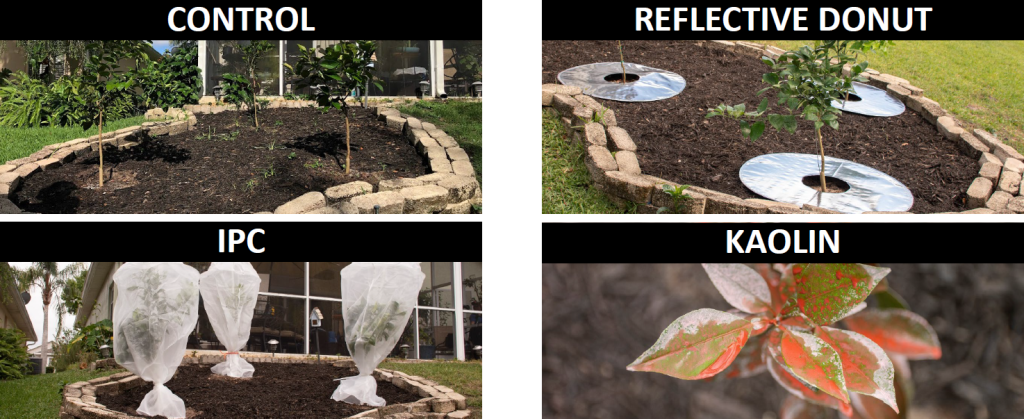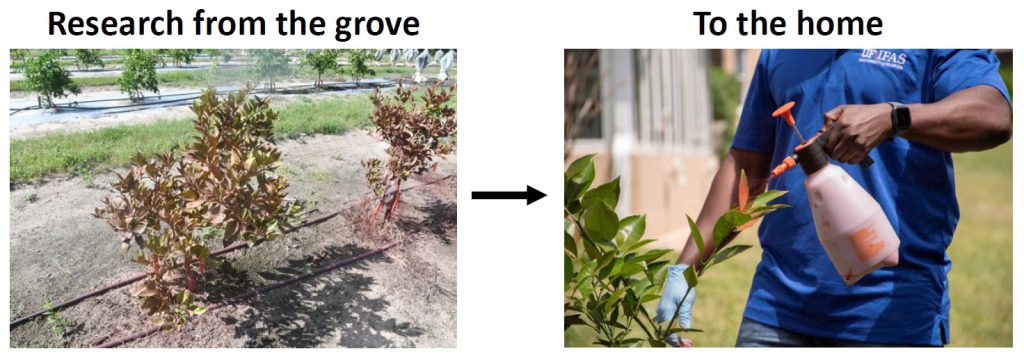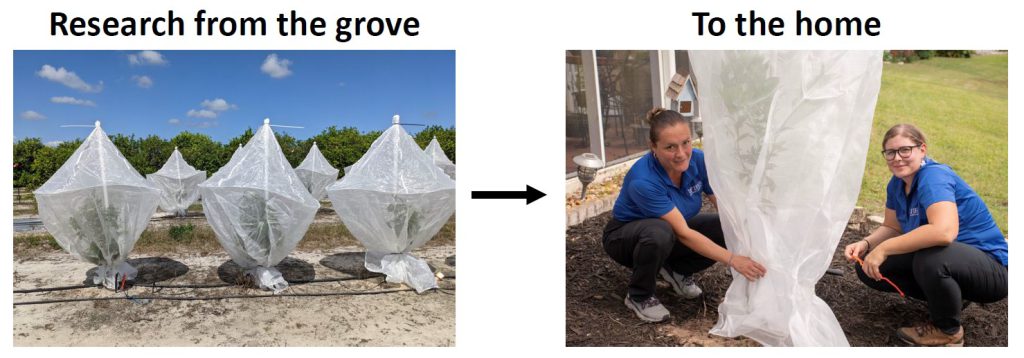Citrus in Florida
Citrus is one of the most vital industries to Florida Agriculture. Unfortunately, over the past few decades, the citrus industry has battled many pests and pathogens that have taken its toll on production. While many new tools have been researched and developed to help commercial growers protect their citrus, not all methods have been accessible to residents and backyard growers. The researchers at the UF/IFAS Citrus Research and Education Center are developing home gardener specific recommendations as to how to successfully grow citrus in the HLB era, taking knowledge learned in the groves and amending it for home gardeners.
UF/IFAS Citrus in the Home Landscape initiative
The UF/IFAS Citrus in the Home Landscape initiative is designed to encourage Florida residents to once again grow citrus in their home gardens. One component of this initiative is a USDA NIFA grant funded research project to evaluate Asian Citrus Psyllid and HLB mitigation tools in residential growing environments. This research project is working with 14 Extension Offices across the state and Orange County was selected to be a part of the initiative. Our Demonstration Gardens have planted 4 sweet orange trees to be observed over the next two years. 1 tree will be the control group, while the other 3 will receive different treatments. Tree #1 will utilize an Individual Protective Covers (IPC), tree #2 will utilize a reflective mulch ring around the base of the tree, and tree #3 will be sprayed with Red-Dyed Kaolin. Our Master Gardener Volunteers have been leading the way on caring for our trees and collecting monthly data.
Photos: T.R. Weeks, UF/IFAS
What is “Kaolin”?
Kaolin clay is a nontoxic approach to managing pests and enhancing growth. Kaolin is a particle film, and when it is added to water and sprayed, it provides reflection, shading, and redistribution of light that increases photosynthesis for the plant. When sprayed onto the leaf, the clay particles reflect light in a way that may camouflage leaves from the Asian citrus psyllid. It also helps to keep the leaf cool, which increases growth. We spray the red Kaolin mix to the upper and lower side of all leaves and reapply when less than half of the earlier application remains or when 2/3 of the outside of the canopy is covered by new growth.
Photos: L.M. Diepenbrock, T.R. Weeks, UF/IFAS
What are “Reflective Donuts”?
Reflective donuts are a modification from the metalized reflective mulch currently being used in some citrus groves. This reflective material can be used to deter several insect pests from finding host plants. It may deter psyllids, which is under evaluation in this trial. The reflective donut will stay installed until the canopy of the tree fully shades the reflective donut. Once the donut is fully shaded, the donut can no longer deter pests.
Photos: L.M. Diepenbrock, T.R. Weeks, UF/IFAS
What is an “IPC”?
Individual protective covers (IPC) are a method of psyllid management. The small mesh protective cover serves as a barrier to prevent psyllids from feeding on young citrus trees. We periodically check the IPC to ensure there are no rips or tears, the bottom of the bag is secured, and it is in good working condition.
Photos: L.M. Diepenbrock, T.R. Weeks, UF/IFAS
Data Collection
The data collection frequency is based on various influences such as time of year and correlated weather/growing seasons. The data being collected is focused on:
- Arthropod Pest Measurements:
- Adult Asian citrus psyllid count
- Presence/absence of spider mites
- Citrus leaf miner count per flush
- Tree Growth Measurements:
- Citrus flush count
- Tree height
- Canopy width and length
- Trunk diameter above the junction (scion, not rootstock)
- Tree Disease measurements:
- Greasy spot presence and relative abundance
- Citrus canker abundance
- Presence/absence of huanglongbing (HLB) symptoms
Do you have citrus questions? We have answers!
The study is funded through 2023 and the data will be analyzed by the researchers of the Citrus in the Home Landscape Team at the UF/IFAS Citrus Research and Education Center in Lake Alfred, FL.
Trouble with your own citrus at home? Check out the educational material at Homecitrus.ifas.ufl.edu or you can email your questions to homecitrus@ifas.ufl.edu. The future of citrus is bright!
The research for this project is funded by the USDA National Institute of Food and Agriculture (Grant # 2021-70029-36054)
Source: UF/IFAS Pest Alert
Note: All images and contents are the property of UF/IFAS.







